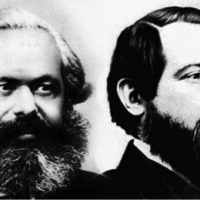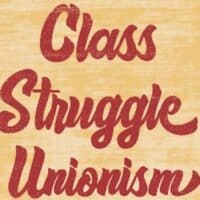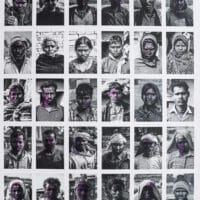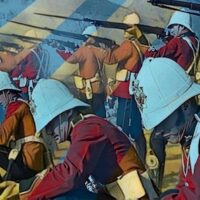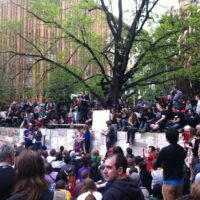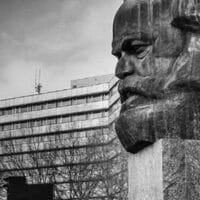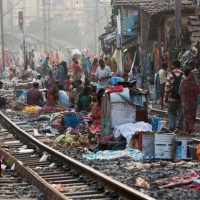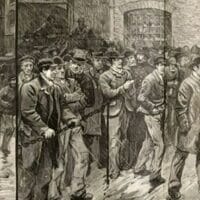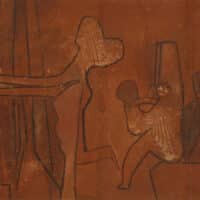-
The great denial: Why they don’t want us to talk about class
In the first of three extracts from his new book, Radical Chains, Chris Nineham asks why the establishment is so desperate to suppress the very idea of class.
-
“Class Struggle Unionism” – book review
Joe Burns’ “Class Struggle Unionism” advocates militant, worker self-organising from a U.S. context, but its lessons are useful here too, finds Kevin Crane.
-
Dossier no. 64: The Condition of the Indian Working Class
In this latest dossier, the Tricontinental offers a broad analysis of the living and working conditions of India’s large and diverse working class.
-
Here comes everyone: climate, class and the movement we need
As thousands prepare to surround parliament to demand climate action, Feyzi Ismail explains the scale of the crisis and the strategy the movement needs.
-
The Culture War doesn’t exist
Call it what it is: class war.
-
The British empire: culture war and actual war
The flurry of criticism and counter-outrage over the classical colonial era is no mere academic matter, warns ANDREW MURRAY: what is being debated is whether fresh imperial slaughter can be sold to the public.
-
Challenging binary gender roles using Nkrumahism-Toureism-Cabralism
Gender binary–the classification of gender e.g. a “man” or “woman” into two, distinct, and opposite categorie–is a construct of class development and division and is therefore inconsistent with the humanist values of our Nkrumahist/Tureist/Cabralist ideology.
-
East Palestine, Ohio and the Oligarchy
A freight train derailment brought environmental catastrophe to a small Ohio town. While the circumstances are somewhat unique, events followed a predictable pattern in a country run by and for the ruling class.
-
Capitalism in Black and Blue
Policing is inextricably linked to racism and to capitalism.
-
Australia’s profit story: How workers experience productivity
If we really want to reverse wage stagnation our unions must use productivity improvement as bargaining power, even withdrawing it, rather than problem-solving it in elite tripartite consultations. Here’s why.
-
Blunders – Splits – War
Today the Linke is tragically split, on both political approaches and personalities.… [M]ost worrisome is the split about the present war. Some in the Left downplay the role of NATO, call for total condemnation of Russian imperialism and total military support for the Ukraine, in agreement with most media positions.
-
Should private property be abolished? Dublin students vote yes
It was a packed room for the Trinity College Dublin Philosophical Society debate on whether private property should be abolished. I was the first speaker and spoke in an impassioned way for the motion. There was much expression of assent in the room.
-
Lenin still haunts the Russian ruling class
“In fact, Zelenskiy is far closer to Lenin than to George Washington. He is a dictator. He is a dangerous authoritarian who has used $100 billion in U.S. tax dollars to erect a one-party police state in Ukraine.” Who wrote this? It is the opinion posted on Twitter by Margarita Simonyan, editor-in-chief of the Russia Today TV network (since 2005) and the Sputnik news agency (since 2014).
-
“Everything that is human is ours”: The political and cultural vanguardism of Antonio Gramsci and José Carlos Mariátegui
Within the heterogenous tradition of Marxism there are two diametrically opposed conceptions of popular culture: the elitist and vanguardist.
-
Ghost stories of capitalism: Racism is REAL, and it’s a class struggle
In today’s political climate, the word racism has become taboo.
-
The working class under neo-liberalism
A NEO-LIBERAL regime entails a spontaneous change in the balance of class power against the working class everywhere. This happens for a number of reasons.
-
Of, by, and for the elite: The class character of the U.S. Constitution
In history and civics classrooms all over the United States, students are taught from an early age to revere the “Founding Fathers” for drafting a document that is the bulwark of democracy and freedom—the U.S. Constitution.
-
Press coverage of declining U.S. life expectancy evades the truth about class
Mainstream media takes on the bad news on life expectancy barely mention international comparisons — notably ignoring China and Cuba — and neglect the political and economic context of the drop, writes WT WHITNEY Jr.
-
The Great Denial: Why they don’t want us to talk about class
This summer’s strikes in Britain and the announcement by the RMT’s Mick Lynch that ‘the working class is back’ will have sent a collective shudder through the ranks of the establishment.
-
Without culture, freedom is impossible: The Thirty-Eighth Newsletter (2022)
In 2002, Cuba’s President Fidel Castro Ruz visited the country’s National Ballet School to inaugurate the 18th Havana International Ballet Festival.

